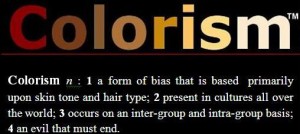(ThyBlackMan.com) I leave you racial dignity. I want Negroes to maintain their human dignity at all costs.
Mary McLeod Bethune
I recently drove my son to check off campus housing at his college and overheard a discussion between several young ladies. They were talking about another girl in a matter that they were unhappy with. One of the disturbing parts of the discussion besides the use of profanity that sounded like sailors (that is a blog for another time) was the way they included in their conversation the young ladies shade of color. You could tell the young lady they were talking about was light skinned because among the many  words was “that high yellow, light skinned”, the rest I cannot put here. Disturbingly they were speaking in public, on a college campus, but how could they be so hateful to reference someone’s shade of color?
words was “that high yellow, light skinned”, the rest I cannot put here. Disturbingly they were speaking in public, on a college campus, but how could they be so hateful to reference someone’s shade of color?
HBCU students are faced with challenges ranging from; financial aid, housing,
food, and the list continues. One of the issues that should not have to be
addressed, but has raised the racist and colorisms of society is the shades of
color of a person. We think that this is outside of a higher educational learning
environment, but obviously many of our young sisters either forgot their
home training or never received any. Stated by Chassidy Hinton, on a brief
history about the origins of color among slaves: “One could look no further than the history books than to see where the dividing factor between African-Americans of a light complexion and those of a brown or darker complexion began. The raping of the darker slave women and the birth of the lighter offspring. Creating various shades of lightness, but where slave owners not caring for their offspring from the slaves (Black College Wire).
Colorism is the remarks to students of a “lighter shade of Blackness.”
There is still the perception that any person with a “drop” of Black blood is
un-pure, by caucasian comparison are considered Black. Writing about racism, Colorism and prejudice there is in many cultures the perception and realism
of Colorism. In the recent E3 Real Talk Real Change “Are You Living Color” the
concern and issue of colorism was raised by Tri Vu, a Vietnamese immigrant
who became a successful architect who spoke of colorism in all cultures not
just African American.
Defining this, Colorism is a global form of discrimination and occurs where
lighter skin tones are preferred, and darker skin tones are considered to be less desirable.
There seems to be an implicit understanding behind this belief that makes the
goodness of the individual related to the darkness (or sometimes lightness) of his/her skin. Terms such as Light Bright, White Girl, High-lighter, High Yellow, Red Bone, Mulatto, Light-skinned-ed, See Through, and even Transparent,” these are names one would think were heard 50 or more years ago, or even on a playground (Felecia Carty2007, Facebook).
Names that have been called on campuses of HBCU’s are similar or even worse, when will we as a people move away from our use of separatists words that were beat into us from past slave owners? Slavery has been over for several hundred years, but the mentalities, emotional baggage and psychological tinge is still present and passed down to younger generations. How can Blacks in America move forward to compete with other cultures for jobs, educational advancement and social acceptance if Blacks still hang on to these ideas of colorism.
I graduated from South Carolina State University and did hear off-hand remarks about colorism during humorous moments, but it seems these sentiments are still growing into hurtful statements. An intelligent person would think that being at an HBCU, students of African-American culture would unite because of a commonality of African ancestry and educational growth. Sadly people seem to look at the things that divide us, rather than the things that should unite us. Ignorance is not bliss, it is hurtful and unproductive.
Psychologists like Julia Hare, (Executive Director of the Black Think Tank), notes that the issue of color is still prevailing. “You would have thought that this thing would have ended after the so-called free movement (civil rights movement) and slavery supposedly was over,” Hare writes. “But black people have taken on the same patterns as the slave master. Wherever you go, I don’t care if it’s in the church, I don’t care if it’s in the bar, I don’t care if it’s in the corporate rooms, I don’t care if it’s on a cruise, color still comes up among black people.”
When one person chooses to judge another in the black community it is usually based on skin color, career choice, marital status or money. Blacks show that they are unaware of the progress that Black society must continue to strive to improve. Black Americans must be reminded we must struggle towards success; instead of constantly looking for means of judging and holding each other back. While other cultures look upon us and comment; their those people go again putting each other down.
Even in our Greek organizations of HBCU’s such as Alpha Kappa Alpha and Delta Sigma Theta there has been past differences of color. Shades, levels, lightness, darkness and skin tones accounted for admittance in our historic Greek organizations. Charing Ball commented, “black people see themselves through a lens that has been deliberately assigned to them and not necessarily of their own creation.” Since the days of slavery Blacks were physically worked, but mentally manipulated. A great quote by a great woman, “I am not tragically colored. There is no great sorrow dammed up in my soul, nor lurking behind my eyes. I do not mind at all. I do not belong to the sobbing school of Negro hood who hold that nature somehow has given them a lowdown dirty deal and whose feelings are all hurt about it. Even in the helter-skelter skirmish that is my life, I have seen that the world is to the strong regardless of a little pigmentation more or less. No, I do not weep at the world—I am too busy sharpening my oyster knife” Zora Neale Hurston (Dust Tracks on a Road).
If I ever see these young ladies again when I visit the college or anyone else and the issue of colorism rises its ugly head again seeking to divide us, I will be sure to educate them that, “you can elect to not play perpetrator, participant, or victim in this nonsense with our people or you can participate to separate us as slavery has continued to successfully do.”
If we as Black people cannot get rid of the slave mentality of colorism no amount of education and no amount of money will lift us out of dehumanizing and degrading each other, leaving other cultures to look upon Blacks as truly a lost and forsaken people.
Some Information gathered from:
Students Taunted for Having Light Skin, By Jernai Ellis, Chassidy Hinton
BlackCollege Wire 2009
Staff Writer; William D. Jackson
Find out more about this talented writer over at; OCS For Education.
Also check out; http://www.About.Me/WilliamDJackson

















Leave a Reply